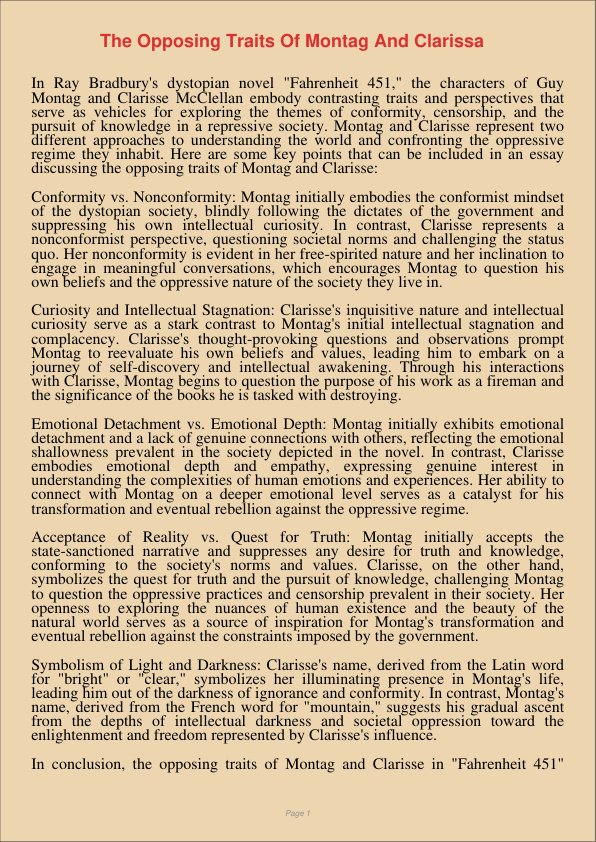The Opposing Traits Of Montag And Clarissa
Dec 31, 2023
opposing traits
montag
Nursing
Management
In Ray Bradbury’s dystopian novel “Fahrenheit 451,” the characters of Guy Montag and Clarisse McClellan embody contrasting traits and perspectives that serve as vehicles for exploring the themes of conformity, censorship, and the pursuit of knowledge in a repressive society. Montag and Clarisse represent two different approaches to understanding the world and confronting the oppressive regime they inhabit. Here are some key points that can be included in an essay discussing the opposing traits of Montag and Clarisse:
Conformity vs. Nonconformity: Montag initially embodies the conformist mindset of the dystopian society, blindly following the dictates of the government and suppressing his own intellectual curiosity. In contrast, Clarisse represents a nonconformist perspective, questioning societal norms and challenging the status quo. Her nonconformity is evident in her free-spirited nature and her inclination to engage in meaningful conversations, which encourages Montag to question his own beliefs and the oppressive nature of the society they live in.
Curiosity and Intellectual Stagnation: Clarisse’s inquisitive nature and intellectual curiosity serve as a stark contrast to Montag’s initial intellectual stagnation and complacency. Clarisse’s thought-provoking questions and observations prompt Montag to reevaluate his own beliefs and values, leading him to embark on a journey of self-discovery and intellectual awakening. Through his interactions with Clarisse, Montag begins to question the purpose of his work as a fireman and the significance of the books he is tasked with destroying.
Emotional Detachment vs. Emotional Depth: Montag initially exhibits emotional detachment and a lack of genuine connections with others, reflecting the emotional shallowness prevalent in the society depicted in the novel. In contrast, Clarisse embodies emotional depth and empathy, expressing genuine interest in understanding the complexities of human emotions and experiences. Her ability to connect with Montag on a deeper emotional level serves as a catalyst for his transformation and eventual rebellion against the oppressive regime.
Acceptance of Reality vs. Quest for Truth: Montag initially accepts the state-sanctioned narrative and suppresses any desire for truth and knowledge, conforming to the society’s norms and values. Clarisse, on the other hand, symbolizes the quest for truth and the pursuit of knowledge, challenging Montag to question the oppressive practices and censorship prevalent in their society. Her openness to exploring the nuances of human existence and the beauty of the natural world serves as a source of inspiration for Montag’s transformation and eventual rebellion against the constraints imposed by the government.
Symbolism of Light and Darkness: Clarisse’s name, derived from the Latin word for “bright” or “clear,” symbolizes her illuminating presence in Montag’s life, leading him out of the darkness of ignorance and conformity. In contrast, Montag’s name, derived from the French word for “mountain,” suggests his gradual ascent from the depths of intellectual darkness and societal oppression toward the enlightenment and freedom represented by Clarisse’s influence.
In conclusion, the opposing traits of Montag and Clarisse in “Fahrenheit 451” serve as vehicles for exploring the themes of conformity, censorship, and the transformative power of knowledge and human connection. Through their contrasting perspectives and experiences, the novel highlights the importance of critical thinking, intellectual curiosity, and the pursuit of truth in the face of oppressive regimes and societal constraints.
